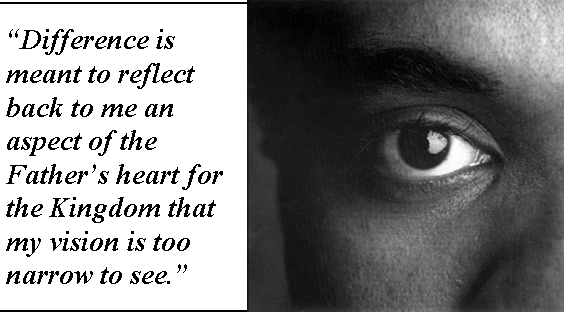Difference Can Make Us Mo’ Betta
 I am reading a very insightful and helpful book titled Whose Religion is Christianity? The Gospel beyond the West (Grand Rapids: Eerdmans, 2003), by Lamin Sanneh, a Native of Gambia. Dr Sanneh is presently D. Willis James Professor of Missions and World Christianity at Yale Divinity School. I have chosen an excerpt that has been especially challenging and discomforting for me, and that I would like to share as some cranial fodder.
I am reading a very insightful and helpful book titled Whose Religion is Christianity? The Gospel beyond the West (Grand Rapids: Eerdmans, 2003), by Lamin Sanneh, a Native of Gambia. Dr Sanneh is presently D. Willis James Professor of Missions and World Christianity at Yale Divinity School. I have chosen an excerpt that has been especially challenging and discomforting for me, and that I would like to share as some cranial fodder.
People often think religion creates closed minds that see difference in terms of intolerance and division. Yet difference can be enriching and mutually instructive, while religion can be reassuring and ironic at the same time. For example, you may sometimes do God’s will only by denying your own. Discernment is a fruit of obedience, and a gift of genuine solidarity. Choice is empty without it. Second, disagreement is not a barrier to dialogue. On the contrary, it is a test of the willingness to presume on each other’s goodwill and to covet the best for each other. To be charitable is to be deserving of charity oneself. Without difference dialogue would be moot. If you feel the need to conceal what you believe for fear of difference, then dialogue becomes just a show, and agreement an illusion. Indeed, agreement by concealment is intolerance by another name, if truth be told. An important issue in the literature on dialogue is thus often confused by the view that difference is threatening, fanatical, harmful, and negative while uniform agreement is sound, inclusive, and enlightened. If that were true, we would all be condemned to sameness, uniformity, and conformity. Yet even then we would not escape the threat, the intolerance, the feuding and the cursing that disagreement is supposed to cause. In light of intercommunal conflicts, intrafamily feuds, and the truculence that often arise in the same race, household, or national or faith community, we arrive at a pretty pass when we approach the world in defiance of difference, or in a misguided optimism about agreement. People often fight because they want the same thing, or make peace because they embrace difference (pages 5-6).
There is a ton of deep stuff in these two paragraphs to meditate on – like a collection of “The Very Best of Far Side Cartoons.” Like I have done, I encourage you to read it many times and allow the Holy Spirit to speak to you.
 In the Body of Christ we are radical diversities and immeasurable differences. We have major differences and too-numerous-too-count subtle and secondary differences. Because of them, we have all experienced being on one side or the other of intolerance and division.
In the Body of Christ we are radical diversities and immeasurable differences. We have major differences and too-numerous-too-count subtle and secondary differences. Because of them, we have all experienced being on one side or the other of intolerance and division.
Category: Living the Faith, Spring 2005


